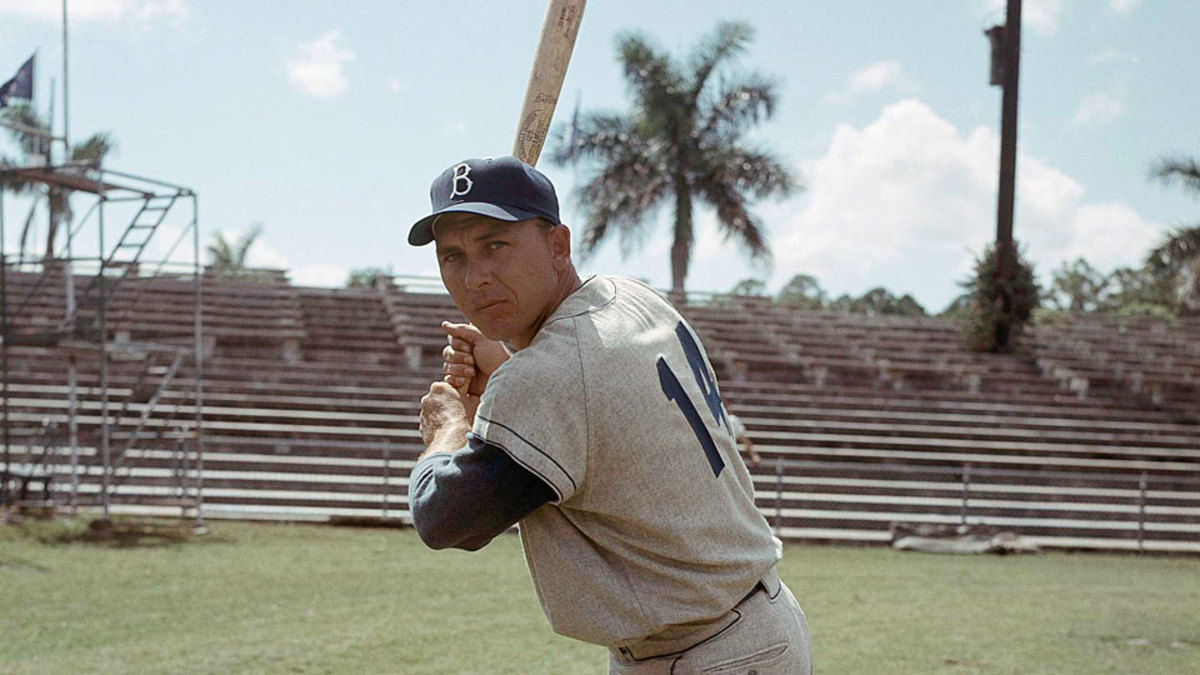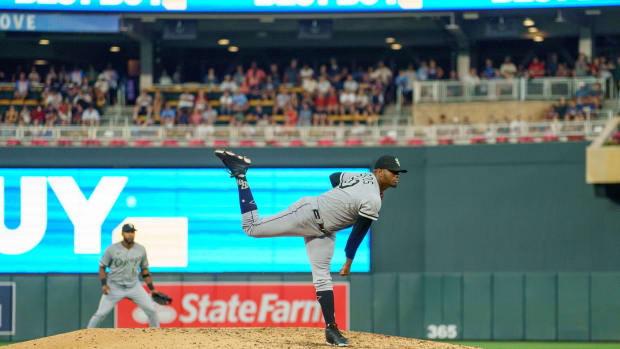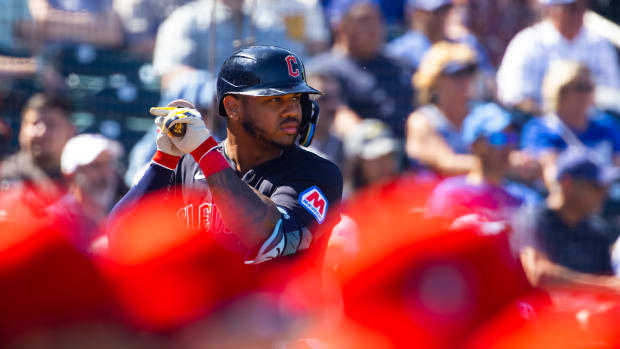
Time for the Hall of Fame to right a wrong by electing Gil Hodges
"Gil Hodges should have been in the Hall of Fame a long time ago."
Twenty-two years ago, those words were spoken by Hall of Fame second baseman Joe Morgan. They are truer still today. The Hall's 16-person Golden Era Committee has yet another chance to right Cooperstown's longest oversight: to elect at last Hodges to the Hall of Fame for his contributions to the game as a player and manager. (Disclosure: my family connects to Hodges' through a marriage.)
JAWS and the 2015 Hall of Fame ballot: One-and-done pitchers
The committee will convene and vote Dec. 7 at the winter meetings in San Diego on the 73rd anniversary of the attack on Pearl Harbor, one of several sites where Hodges later served as a Marine in the Pacific Theatre, where he earned a Bronze Star while putting his fledging major league career on hold. The results of the vote, in which the committee will consider 10 candidates who made their greatest impact from 1947-72, will be announced the following morning. Election requires being named on 12 of the 16 ballots (75 percent).
Hodges played his last game 51 years ago and died 42 years ago, just two days before his 48th birthday. So much time has passed that it threatens to obscure his impact on the game. When Hodges retired, for instance, his 370 home runs ranked 11th all-time; the 10 sluggers in front of him and the seven sluggers behind him on the list are all in the Hall of Fame. Today, those 370 homers rank 75th.
It's the job of the Golden Era Committee, however, to place Hodges in proper context: "So the voters can compare candidates against other candidates from their own time," as well put by Jack O’Connell, the secretary/treasurer of the Baseball Writers’ Association of America and a member of the BBWAA's Historical Overview Committee, which constructed the ballot.
The Golden Era Committee is instructed to consider the entirety of Hodges’ contribution to baseball. That means weighing his record as a player and manager, which differs from the 15 years on the writers' ballot in which he was considered only as a player. The committee should ask itself this important question: In what ways did Hodges stand out from his peers as a player and manager? We are talking about a great American life.
The Hall of Fame chances for 2015's Golden Era nominees (Part 1)
Hodges was a war hero, a role model, one of the most revered members of Brooklyn's Boys of Summer, a two-time world champion as a player and the leader behind one of the greatest upsets in sports history, when he managed the Mets to the 1969 World Series championship. In Brooklyn and his home state of Indiana, there are bridges, streets, high school stadiums and Little League fields and teams named after him as much for his character as for his playing record. Yes, character matters. But Hodges has enough of a Hall of Fame resume even before you consider his outstanding citizenship.
The committee has to know that Hodges wasn’t just a good player and a good guy. It has to know that he built a uniquely great playing and managing career, filled with rare achievements that help define a Hall of Famer. It has to know these facts that set Hodges apart:
• Hodges became the first National League first baseman ever, and is still one of only two all-time in the NL, to post seven consecutive seasons with at least 23 home runs and 100 runs batted in. The only other: Albert Pujols.
• Hodges was the best first baseman in baseball for more than a decade. From 1948 to 1959, he led all major league first basemen in home runs, RBI, total bases, extra-base hits, OPS, runs created and times on base.
Among all major league players over those 12 seasons — regardless of position — Hodges ranked second in home runs (behind only Duke Snider), second in RBI (tied with Yogi Berra and behind Stan Musial), third in total bases, extra-base hits and runs produced (behind Musial and Snider in each category), fourth in runs created (behind Musial, Ted Williams and Snider) and fourth in times on base (behind Musial, Richie Ashburn and Eddie Yost).
• His Dodgers teams won five pennants in seven years in his prime, and Hodges also was considered the game's best defensive first baseman in those years. (The Gold Glove Award was not established until 1957, when Hodges was 33 years old, and even then, he won it each of the first three years it was handed out.)
• He became the first player ever to hit four home runs in one game off four pitchers, and the first NL player to hit 14 career grand slams.
JAWS and the 2015 Hall of Fame ballot: Burning questions
• He played the most games at first base in World Series history. Though Hodges gained both infamy and empathy for his 0-for-21 slump in the 1952 World Series (it’s a measure of his overwhelming popularity and respect as a player that a priest in Brooklyn famously asked his congregation to pray for him), he became an outstanding Fall Classic player. In 26 World Series games after 1952, Hodges batted .337 with a .915 OPS.
• Hodges remains the only player in World Series history to have a multi-RBI Game 7 that accounted for all of his team's runs. His performance in Game 7 of the 1955 World Series was clutch on a legendary scale. Hodges drove in both runs in the Dodgers' 2-0 win, earning Brooklyn its only world championship.
• Hodges' combination of slugging as a player and success as a manager is unique in baseball history. His 370 career homers are by far the most ever by a player who went on to win the World Series as a manager. The next greatest home run total by a World-Series-winning manager is 301, by Hall of Famer Rogers Hornsby.
• With the 1969 Mets, Hodges became the first manager to lead an expansion team to the World Series title. It is considered one of the greatest managerial feats in history, and not just because Hodges outmaneuvered Hall of Fame manager Earl Weaver to take down the heavily favored 109-win Baltimore Orioles. Those Mets also posted a 27-win improvement from the previous season, with Hodges deploying expert platoons for his positional players and extra rest for his starting pitchers.
• Hodges' innovative work helped popularize the five-man rotation and became a template of how to handle young pitchers. After joining New York in 1968, Hodges inherited Tom Seaver, Nolan Ryan, Jerry Koosman and Tug McGraw, all of whom were between 21 and 25 years old. Those four pitchers threw a combined 85 seasons in the major leagues.
The Hall of Fame chances for 2015's Golden Era nominees (Part 2)
The uniqueness of this baseball life should be enough to convince the committee. But there’s something else worth considering: In more years and more ways, Hodges has come closer to the Hall of Fame without actually getting in than any man in history. Since he first appeared on a ballot in 1969, Hodges has had 45 years worth of near-misses that define him as the longest-running best candidate to not be elected:
• Hodges received the most total Hall of Fame votes from baseball writers than any player never admitted to the Hall (3,010).
• In 15 different BBWAA ballots, Hodges received more votes than 27 eventual Hall of Famers a total of 146 times.
• Hodges had enough votes to be elected by the Veterans Committee in 1993 (12 out of 16), only to have committee chair Ted Williams disallow the vote of Roy Campanella, one of Hodges' former teammates, because he did not attend the meeting in person. Campanella was hospitalized at the time. With that ballot rejected, Hodges and Leon Day were left one vote short of enshrinement, with 11 of the 15 votes leaving them at 73.3 percent, 1.7 percent shy. Campanella died three months later. Day was elected when the new committee met two years later.
• Hodges received the most total Hall of Fame votes (152) from the three elections of the revamped Veterans Committee — the ones from 2003, '05 and '07 consisting of Hall of Fame players, writers and broadcasters — than any player never admitted to the Hall (Hodges, for instance, outpolled future Hall of Fame selectee Joe Gordon by a combined 152-44.)
• Hodges is the only player to get 50 percent support from the writers and pass through the Veterans Committee and still not be elected to the Hall. He received a majority of the writers’ votes 11 times.
As the years have passed, people have taken up the wrong argument against Hodges, framing his career against the likes of Fred McGriff, Carlos Delgado and the modern game. That’s not the job of the Golden Era Committee. Its members' job is to measure Hodges as both a player and manager against his peers; that’s all. When they do it with proper diligence, they should conclude as Morgan did more than two decades ago: Gil Hodges is a Hall of Famer too long in the waiting.


































